Text
Ranking of Kings: Hell and Demons
Offered to Jesus through Mary
Matthew 22:13 “Then the king said to the attendants, ‘Bind him hand and foot and cast him into the outer darkness. In that place there will be weeping and gnashing of teeth.’”
Spoilers?
No big spoilers this time around. I’ll refer to one scene and one character out of context, but that’s all. If this whets your appetite for the show then go ahead and watch it. If not, then still give it a try. It’s a good show that keeps you hooked. Not to mention the second opening is a banger.
Our Topic
Towards the end of the show, we’re shown a depiction of hell where the souls of the damned are eaten, regurgitated, reformed, and then eaten again ad infinitum. If this reminds you of Dante’s Inferno, you’re not alone. Also, good job! Being well-read in literature guarantees you pick up on all the inside jokes and references people make. Setting aside the early Italian renaissance – what’s important here is that Hell isn’t just a fiery time out corner. The damned aren’t just thrown into Hell. They are actively punished while in Hell and they’ll be in Hell forever. This should properly terrify us. If we think the “sweet release of death” frees us from all our problems, we may be in for a rude awakening.

The unnamed demon eating someone’s soul.
But before we get too gloomy, let’s take a step back. Ranking of Kings did a good job showing us how horrific hell is. But if this article is going to serve a purpose, we should see how someone ends up in Hell. We could say ultimately this is done by rejecting salvation through Christ. That’s the general answer. For specific answers we can look at all the various ways someone separates himself from Christ. For now, I’d like to focus only on one way: pacts with devils. If we believe the rising statistics of people claiming to worship pagan gods, then we shouldn’t be surprised that more people – knowingly or unknowingly – are entering into pacts or contracts with devils.
In Ranking of Kings things are comically straightforward. Miranjo, a young woman, has made a pact with a demon who tells her upfront “when you die, I’ll devour your soul”. We might dismiss this and say “she was desperate, and it was for the sake of the plot.” That’s fine with me. I’m not trying to prove or disprove her character. Pay attention to what the demon says. It’s simplistic, sure, but the pact made between Miranjo and the demon demonstrates truths about our spiritual warfare this side of Heaven. Contracts are a two-way street. Each party does something for or to the other. But this doesn’t mean both sides are equal. In making a pact or contract with a demon, a human places himself under that creature’s power structure in the hopes that one metaphysically higher than himself can achieve what he cannot.
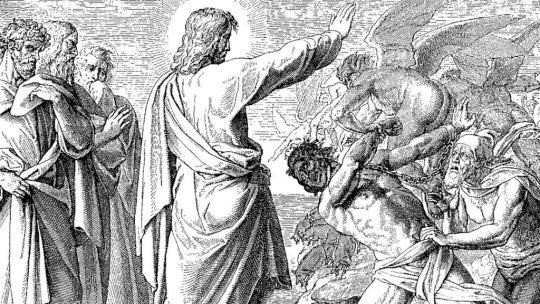
Christ casting out demons
Here’s the catch. Demons cannot guarantee their side of the bargain. All their actions are confined by the permissive will of God. They serve the father of lies, so why should we believe anything they promise?
Alternatively, the Paschal Mystery of Christ is what establishes a new covenant (i.e. contract) between God and mankind. In Baptism we die and rise with Christ. This takes us out from the domain and power structure of sin and death and places us in our Heavenly Father’s house. Only by our own free choices do we find ourselves outside such divine protection.
Okay, so what?
I don’t expect many readers to have experimented with occult practices. Again, good job! But regardless of our history, I want to recommend a simple practice: repeating the renunciations made at our Baptism. It’s a small way of reminding ourselves who exactly we’ve put our trust and hope in. Let us firmly say I do to the follow.
Do you renounce Satan?
And all his works?
And all his empty show?
Do you believe in God, the Father almighty, Creator of Heaven and Earth?
Do you believe in Jesus Christ, His Son, our Lord, who was born of the Virgin Mary, suffered death and was buried, rose again from the dead and is seated at the right hand of the Father?
Do you believe in the Holy Spirit, the holy Catholic Church, the communion of saints, the forgiveness of sins, the resurrection of the body, and life everlasting?
St. Justin Martyr, pray for us!
#catholicism#catholic anime#anime analysis#animechristi#ranking of kings#ousama ranking#hell#baptism
4 notes
·
View notes
Text
The Cat Returns: Self Identity
I give this to Jesus by the hands of His mother
Romans 8:15 “For you did not receive the spirit of slavery to fall back into fear, but you have received the spirit of sonship.”
1.) To those who suffer
First, I want to say to everyone who has struggled and currently struggles understanding their God-given identity: “God loves you so much; He made you in His image and likeness which is a mystery we will never plumb the depths of this side of heaven. Let us follow Jesus to find the path forward.”
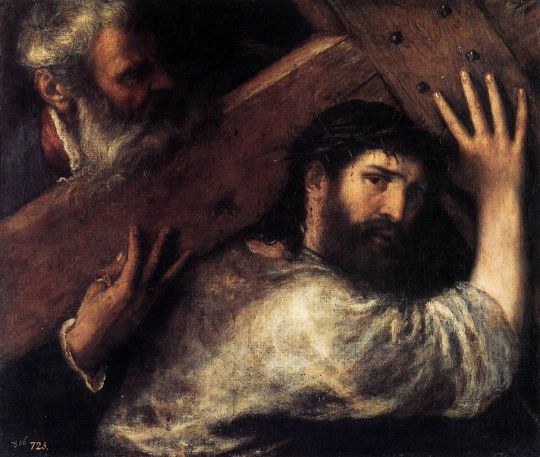
Even in accompaniment the path forward can feel unbearable, but with Jesus we shall reach the end.
2.) A little different style
Usually, I pick a scene or character from a show, but for this movie I’ll walk through the plot in an annotated way because the movie is short and is best treated as a whole.
3.) A 21 year old movie
The Cat Returns was released by Studio Ghibli in 2002 as a spin off to their earlier success Whisper of the Heart. I watched it for the first time just two weeks ago and was surprised by how well it spoke to our culture in the 20+ years it’s been around. It’s only 75 minutes, so go watch it if you’re able.
An unsatisfied heart
Our story begins with school girl Haru Yoshioka who wonders if she even has a place in this world. Home life is bland, she comes to school late regularly, her crush started dating the prettiest girl at school, she almost gets hit by a truck trying to save a cat, and nothing seems to go right. So when the king of cats shows up and wants her to move to the “Cat Kingdom”(TM) and marry
the cat prince she saved, she freaks out “I’m not a cat this is ridiculous!” but then she wonders: “Maybe it wouldn’t be that bad, after all what do I have going for me here?”
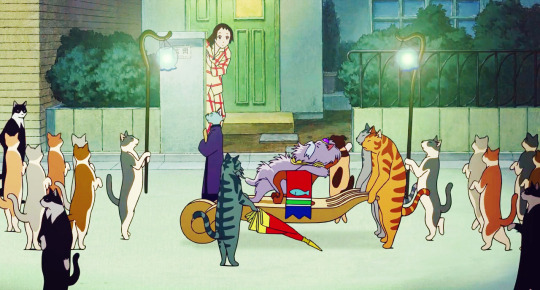
The cats come in the middle of the night – when Haru is alone – to propose she marry the cat prince.
Perhaps you haven’t experienced this in your life. But when I see problems going on in almost every area of my life, it’s easy to say: “The world and I don’t get along, and changing my habits isn’t enough because it’s not about what I do it’s about who I am. If only I were [fill in the blank] then I wouldn’t have these problems, if only I were [fill in the blank] then the pain and anxiety would go away.”
If you’ve never thought something like that, then God bless you, But for those who have, please notice one thing. The focus shifts from the particular problems in our life to our identity itself, and because the focus is now on ourselves it is also we that must do all the work – we’ve left no space for God.
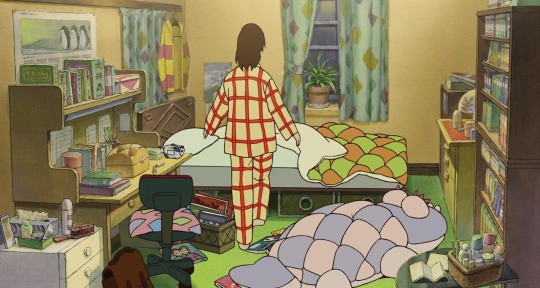
This is Haru going to bed presumably indicating that her room was left like this. Is it simply carefree or is it floundering?
Back to the story:
Haru doesn’t have much time to think the offer over before she stumbles upon a stray cat (Muta), a cat figurine (The Baron), and a crow (Toto) who want to help her out. They agree with her original thought that moving to the Cat Kingdom is ridiculous. To calm her worries Baron tells her discover where you truly belong and then you’ll have nothing to worry about. Before they can talk any further, however, the cat kingdom comes out of nowhere and sweeps Haru away to their homeland, with Muta and Baron chasing after them.

Haru quite literally kidnapped by a stampede of cats.
What’s fascinating is that once Haru arrives in the Cat Kingdom it’s very explicit that she doesn’t belong there. Keep in mind Baron’s words to her previously: “Find where you belong and you won’t need to worry.” It’s clear she doesn’t belong in the Cat Kingdom which implies that she needs to return to the human world. But there is a point of no return. By simply being in the cat Kingdom, Haru starts transforming into a cat. Even if she doesn’t actively will it, she picks up the culture she is surrounded by. She must return to the human world by dawn in order to become human again.
Disoriented by her transformation, Haru finds herself gloomily accepting her new life, until the Baron breaks in to rescue her. A passing friendship she almost turned down has come into this foreign land to bring her back. Does Baron assert his worldview onto Haru’s new life style? Yes, because she is not where she belongs. How does the Cat King feel about this? He’s outraged. He doesn’t want anyone leaving his kingdom. To secure Haru’s permanent place the king wants her to marry his son and if she won’t then she’ll marry the king himself! Haru of course by this point wants to return with Baron to her world and rebukes the king to his face. What caught my attention here was the subtle censorship in the English dialogue. While the subtitles read “you crazy king” the Japanese word Haru uses means “pervert.” It is the king’s lust that has driven him crazy.

The crazy king is excellently portrayed as unkempt and with unfocused eyes showing he is lost in his own desires.
In their route to escape Haru, Muta, and the Baron must cross a labyrinth and climb a tower at the top of which is a portal that leads to the human world. This task seems hopeless, but Muta starts climbing and running along the walls of the maze proclaiming “we don’t have to play by their rules!” They are going home; they don’t need to follow the cat’s rules. As they start to climb the tower Haru slows down being exhausted by the whole things. “I’ll catch up, go on ahead” she says to her friends. To which Baron simply picks her up and carries her the rest of the way. We should not think we can do everything ourselves, even under the disguise of ‘go ahead I’ll catch up.’ This is a great foil to Haru’s earlier line when she first meets Baron and says “I got into this mess, I have to get myself out.” She learns first hand that it’s okay to be carried by our friends.
As we enter the last section pay attention to the back and forth of hope and despair.
In a last-ditch effort, the cat king is crazy enough to destroy the tower leaving the portal sitting in the sky unreachable. The goal is in sight but seemingly unobtainable. Even when Haru miraculously reaches the portal and comes back into the human world she’s floating in the middle of the sky! What seemed to offer her a way back now seems to only offer death! She falls and prepares for the worse, but the Baron and Muta also made it through the portal and they tell her to look down, in other words: face her fear, confront the thing the seems to only be certain death. It is then that we see Toto (the crow from before) – who didn’t make it into the cat kingdom, but waited for Haru to return. He has brought his friends with him too and they swarm the three falling friends gently letting Haru come back to earth. If she had not looked down, she would not have been caught by the friends that awaited her on the other side.
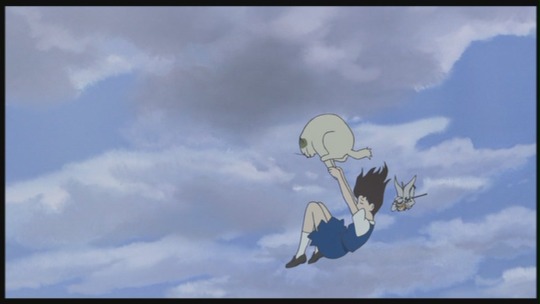
Escape death in the cat kingdom only to die in the human world?
In the closing scenes we see how Haru has changed despite going back to what was her “normal life.” She gets up early, makes breakfast, and is confident in herself. Her crush who was dating a prettier girl no longer has any effect on her. I skipped over a detail earlier to bring it up now. Baron, who is a cat figurine, knows he is a toy come to life. He knows his Creator i.e. his father, and knows that it is out of love that he has come to life. He stated this clearly when first meeting Haru. In short, he is confident in his identity – he knows where he belongs and so has nothing to worry about. And Haru too, with the example of Baron to show her the way, knows where she belongs and now has nothing to worry about.

4.) It’s almost over I promise
This may come across as a one-sided persuasive speech. But I mean this for everyone: those struggling with understanding their God-given identity and those who aren’t; those who know someone who is and those who have never met someone suffering in this way. If even one of the four characters in The Cat Returns had been missing, the myriad of challenges would not have been overcome. Each of us play an active part. These crosses are not born by telling someone what to do, but rather – like Simon the Cyrene – stepping in to help carry them.

#catholic anime#catholicism#anime analysis#overthinking#animechristi#catholic#studio ghibli#the cat returns
0 notes
Text
My Hero Academia: Sacramental Theology
2 Corinthians 1:21-22 “It is God who establishes us with you in Christ, and has anointed us, and who has also put his seal on us and given us his Spirit in our hearts as a guarantee.”
1.) No background
If you haven’t heard of My Hero Academia (MHA) or read our previous article about it, you still wouldn’t need much of an introduction for the purpose of this post.
Picture a world where superpowers (a.k.a “quirks”) are common fare. Our main character, Deku, was quirkless when out of nowhere he’s given a power by none other than the number one hero in Japan. Deku and his classmates spend their school days at the Hero Academy developing their quirks to become professional heroes.
Congratulations, you’re officially in the loop : )
2.) Our focus this time
MHA makes it quite clear that by persevering in training, people can expand the range, duration, or other qualities of their quirk. E.g. you can produce hotter flames, or float longer, or control more objects with your mind. The initial power is there but it can deepen and grow into something particular to how the individual uses it.

Deku from MHA is victorious after battle, but barely standing. Growth only happens when we surpassing our current limits making it often a painful process.
3.) Jumping to Church Talk™
We can see some obvious similarities between quirks and the Catholic view of Sacramental Character. That’s another way of saying the indelible mark left on our souls by Baptism, Confirmation, and Holy Orders. I think too often people see Baptism and Confirmation as getting your hand stamped at an amusement park. BOOM BAPTISM! Congratulations, now you’re officially allowed to do “Catholic Stuff”
But baptism is so much more! It places a well springing up to eternal life in the soil of our soul! If we allow the life-giving water of the Holy Spirit to enrich all parts of our life then we will bring forth trees and plants of every kind. But we could also neglect our baptism. The well placed in such a garden would still be there but would grow stagnant, the garden would get overgrown with weeds and we might even put a lid on this well of life-giving water so we don’t have to look at it.
MHA does a good job of showing how if we are to develop our gift we need to put in the work. We haven’t earned in anyway such a gift as baptism – or in MHA, the person’s quirk – but because we have been given it, we can decide to cultivate or neglect it. Over the course of the show this has been shown quite nicely in the character development of Kirishima, Todoroki, Bakugo, and of course Deku.

Portraying good habits (virtues) as connected and growing with and from each other has led to some great artwork - mostly hidden in medieval manuscripts.
4.) Is there another level?
Now many of you might be saying “That’s great but what about when someone’s quirk gets taken away and they’re left powerless? That doesn’t fit your baptism comparison at all.” You’d be right. Baptism, Confirmation, and Holy Orders can’t be undone or redone. But the other sacraments can.
This is where we can dive into some good old scholastic terminology. This will let us distinguish 3 parts to each sacrament. The first term is sacramentum tantum which refers to the liturgical rite by which the sacrament is conferred. For example, the vows exchanged in Matrimony, the water and trinitarian formula for Baptism, the words of consecration for the Eucharist. The second term is res et sacramentum, this refers to the reality which the sacramentum tantum gives to those receiving the sacraments. For Baptism this is the indelible mark, for the Eucharist it’s the Body, Blood, Soul, and Divinity of Christ, for Matrimony it’s the marital contract established between the spouses. Finally, we have what’s called the res tantum which refers to the graces and consequences of receiving the res et sacramentum. In Baptism this is the forgiveness of original sin, in the Eucharist it’s an increase in charity and communion with the Body of Christ, in Matrimony it’s the grace to live out married life.

A helpful chart found in the book Touched by Christ: The Sacramental Economy
4.2 Okay that was a lot…
But we’re done with terms now! And if you want a crude analogy, think of it as the giver, the gift, and the use of the gift. These 3 terms help us quite a bit. Let’s look at the repeatable sacraments using the terms we’ve learned and the question from before about quirks that can be taken away.
First, we’ll compare a quirk to the res et sacramentum that is received. The superpower or ability is always there but not always manifested. Additionally, just as a quirk can be trained and honed to a better degree, so too can the sanctifying grace we receive in Baptism be deepened and greater love of God can be poured into our hearts (Rom 5:5). But let’s return to the question of people that have their quirk stolen. How does this fit into the scheme?
5.) Let’s get our answer already!
To answer the question, let’s use the Eucharist as our example. Recall we said the res et sacramentum of the Eucharist is the real presence of Christ: Body, Blood, Soul, and Divinity. We indeed receive this but it does remain in us forever. We all know that when the Host loses the characteristic of bread or wine it ceases to be the Eucharist. This is where the practice of ablution cups comes from and why we don’t become permanent tabernacles of the Blessed Sacrament from our first Communion.
The logical consequent then is that because the res et sacramentum is gone, the channel through which we receive the res tantum is also gone. The practice of making a spiritual communion is precisely asking for the graces of Holy Communion – the res tantum – while not having received the res et sacramentum. You’ll also notice that spiritual communion does not replace sacramental reception because in only the latter do we actually receive the true presence of our Lord.
Thus, in My Hero Academia, when a person’s quirk is taken away they no longer have the means to use their power. But, when this is restored to them, just like receive Holy Communion, or Reconciliation, they are able to use their quirk once more.
6.) So then, we’re done?
Almost. We talked about a couple things. First, the graces that come from the sacramental character. Second, the gifts we have can be developed through our actions. Now let’s put them together. In baptism we are given sanctifying grace and the indwelling of the Holy Spirit. This is deepened in Confirmation when we receive the gifts of the Holy Spirit. Now these gift and virtues – just like the quirks of MHA – don’t have to be used. However, when they are used it becomes easier to use/take action the next time. This is how literally how habits and virtues are built: by doing individual good actions repeatedly. Is this difficult at first? Completely. It’s impossible without God’s help. But, does it also become easier the more we practice? Of course. Deku couldn’t use 10% of his quirk to begin with but was able to slowly increase his body’s capacity.
As Christians we need to be confident in our Baptism because by it we have been united to Christ. We know that the Holy Spirit dwells in us and by His grace we have Faith, Hope, and Charity. Now this isn’t like a spiritual communion where we ask for the graces of the sacrament despite not having the reality and sign of the sacrament within us. Rather, Baptism is permanent so as long as we haven’t caused the Holy Spirit to depart from us by grave sin, we can continually call upon the Holy Spirit to give us more grace, more help, more assistance in carrying out our daily tasks so that what may be difficult to begin with is one day easy.

An image showing that each and every sacrament always offers us a unique connection to Jesus. Each has a distinct purpose, but they all proceed from Jesus and in turn draw us closer to Him if we allow Him.
To close I’ll simply recommend making acts of Faith, Hope, and Love which you can find in almost any Catholic prayer-book, here is a link to them. And for your personal prayer, never be afraid to call upon God’s help in any time and place.
#catholicism#catholic anime#anime analysis#animechristi#overthinking#my hero academia#theology#sacraments#catholic#anime and manga
0 notes
Text
Teenage Mercenary: Humility
Luke 1:48 “Because he hath regarded the humility of his handmaid; for behold from henceforth all generations shall call me blessed.”
Disclaimers
Teenage Mercenary as of June 2023 is an incomplete Webtoon so I can’t comment on the series as a whole.
Big surprise a series about mercenaries will contain violence and cursing and there are advisories for each chapter. Webtoon itself puts a warning up but there’s no hard lock out to my knowledge so do with that what you will.

Boilerplate a.k.a. “The Premise”
Our main character “Ijin Yu” was raised with mercenaries and has recently quit to finish high school and meet the little family he has left. Unfortunately for those Ijin runs into, you can’t take the fight out of the kid. While protecting his friends and sister, he is slowly drawn into the messy life of Korean corporate manage while he’s fine with keeping a simple bodyguard job to support his family.
Our main theme: Humility
Ijin is a man of few words. This of course gives him the silent but deadly fighter trope. But more surprising is that when he is complimented or offered extra compensation, he turns it down saying he was only doing his job. Here we see that Ijin practices the virtue of humility.To clarify, humility is the proper estimation of our own skills and on a fundamental level a proper knowledge of who we are (cf. the Catholic Encyclopedia). For Christians this means acknowledging our worth before God our Father. We are completely dependent on Him for everything (1 Cor 4:7). We are incapable of praying without His help, but because by Baptism we have become His sons we now are capable because of the Holy Spirit in us (Gal 4:6).
Our Specific Scene:
Very minor spoilers: At one point, after a successful rescue mission Ijin is given the classic “we couldn’t have done it without you.” His response is that he couldn’t have done it without the others on the mission as neither of them could have done it alone. He praises the work of his partner and shuts down any further discussion with a great line: “The goal is to secure the safety of the VIP, not to figure out who made the greatest contribution.” This is a great example of how humility helps us avoid the self-glorification of pride.
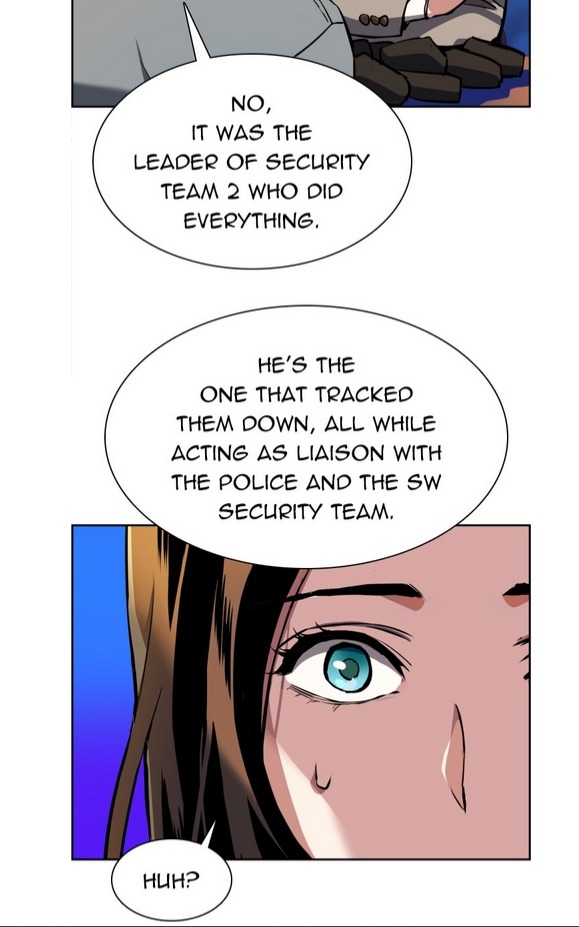
Ijin's friend is surprised to find him praising his teammates
Okay, so what’s the point?
I’m getting there, but first:
In recent years, June has been dubbed “Pride month,” so that under the guise of community support, individuals defend misguided love and promote a morality based on only on emotions. For Catholics, June is a month to celebrate the Sacred Heart of Jesus, a heart which loves more than we ever could, a heart which has experienced the same emotions we have, a heart which always shared those emotions and struggles with His Father, a heart which drew the power to carry on from His constant conversation with His Father.
Here’s the point:
Humility, a.k.a. the first beatitude “poor in spirit,” is the foundation of the Christian life. Our goal isn’t to see who is holiest, our goal is to see God, to get to heaven. I am not saying “don’t aspire to greatness.” We are all called to and made for greatness. But our greatness comes from looking at Jesus and imitating Him, not from looking at others and trying to be better than them.
Remember: Humility isn’t beating ourselves up. Our protagonist Ijin knew his abilities, but knew his limits and his need for help.
Perhaps the best imitator of Jesus was Mary His mother. She humbled herself knowing exactly who she was and just how much God had done for her. It was this humility that won her the privilege to have all generations call her blessed.

Mary and Elizabeth don’t compete for whose child will be greater, rather they both rejoice in how good God is to His people.
To close I leave you with the Litany of Humility. It’s a prayer I struggled with at first but have grown to love.
LITANY OF HUMILITY
O Jesus, meek and humble of heart, Hear me!
From the desire of being esteemed, Deliver me, O Jesus.
From the desire of being loved, Deliver me, O Jesus.
From the desire of being extolled, Deliver me, O Jesus.
From the desire of being honored, Deliver me, O Jesus.
From the desire of being praised, Deliver me, O Jesus.
From the desire of being preferred to others, Deliver me, O Jesus.
From the desire of being consulted, Deliver me, O Jesus.
From the desire of being approved, Deliver me, O Jesus.
From the fear of being humiliated, Deliver me, O Jesus.
From the fear of being despised, Deliver me, O Jesus.
From the fear of suffering rebukes, Deliver me, O Jesus.
From the fear of being calumniated, Deliver me, O Jesus.
From the fear of being forgotten, Deliver me, O Jesus.
From the fear of being ridiculed, Deliver me, O Jesus.
From the fear of being wronged, Deliver me, O Jesus.
From the fear of being suspected, Deliver me, O Jesus.
That others may be loved more than I, Jesus, grant me the grace to desire it.
That others may be esteemed more than I, Jesus, grant me the grace to desire it.
That, in the opinion of the world, others may increase and I may decrease, Jesus, grant me the grace to desire it.
That others may be chosen and I set aside, Jesus, grant me the grace to desire it.
That others may be praised and I go unnoticed, Jesus, grant me the grace to desire it.
That others may be preferred to me in everything, Jesus, grant me the grace to desire it.
That others may become holier than I, provided that I may become as holy as I should, Jesus, grant me the grace to desire it.
Amen.
#catholicism#anime analysis#overthinking#catholic anime#animechristi#webtoon#teenage mercenary#humility#litany of humility
2 notes
·
View notes
Text
Weathering With You: Reading Scripture
Revelation 12:1 “And a great sign appeared in heaven: a woman clothed with the sun, with the moon under her feet, and on her head a crown of twelve stars.”
First, background
Weathering with You is a 2019 anime film by Shinkai Makoto – who you’ll recall from our Suzume article. Shinkai’s taste for blending a regular boy meets girl story into one with supernatural & worldwide consequences is again on full display here.
Second, here’s the story in 5 sentences
Our story follows runaway student Hodaka working in Tokyo for an amateur magazine company. Tokyo has been having unusually rainy weather and Hodaka’s company bites at the story of it being a supernatural problem. The solution everyone is talking about is a “sunshine maiden” –
a girl who can control the weather. Hodaka meets such a girl, Hina, and the two go around Tokyo warding of the rain. However, we soon find out that clearing up the skies is slowing killing Hina and she must either sacrifice herself completely to restore the original climate, or watch whole parts of Tokyo be lost to higher water levels.

Hodaka watches as Hina clears the rain over the city
Third, our focus here
What I like about Weathering with you are its layers of interpretation. On a personal level we can talk about if it’s better to leave a loved one to serve the country or instead if each person also has the right to live out their days with their family. But on a supernatural level, I think it has even more to offer. This comes from a simple question: what is the natural state of Japan? We learn that for centuries sunshine maidens have been sacrificed to hold back the rains, but is this really mankind being virtuous or simply selfish? Perhaps the sunshine maidens aren’t sacrificed to save the people’s lives but merely for their convenience? Once this dilemma is put forth, it can’t be ignored. Finally, Hina’s and Hodaka’s choice is seen as good or imperfect depending on how we view the background dilemma of Tokyo’s natural state.
Fourth, what’s the point?
Precisely that more than one way of interpreting the story’s conflict doesn’t rule out other interpretations. Can we view Hina’s opportunity to sacrifice herself to save the people of Japan as Christ-like? Sure. Could we also view it as humans trying to change nature rather than oversee and work with it? Of course. The two aren’t necessarily mutually exclusive. Don’t get me wrong, I’m not saying everything is a free-for-all and there is no inherent or objective meaning. What I am saying is that affirming one sense of the story doesn’t mean that is the exclusive sense of the story.
If this is true for simple man-made fiction, how much more for the Bible, which contains the inspired Word of God? Many disagreements in Christianity happen because people interpret passages of the Bible in an exclusive sense. As Catholics we have a rich tradition of reading Scripture in a literal, allegorical, moral, and anagogical way (check out Catechism paragraphs 115-118). For example, the Israelites literally crossed the red sea to escape slavery in Egypt, but allegorically this prefigures Christ leading us out of slavery to sin. Morally, this leads us to no longer live as we used to; and anagogically we now keep our eyes focused on heaven our eternal home.
Other common examples include the opening quote of this article from Rev 12:1 or St. Peter’s confession from Matthew’s Gospel (Mt 16:18). Does the woman in Revelation signify the Church or specifically the Virgin Mary? Affirming one of these doesn’t exclude the other. Similarly, in Matthew’s gospel is Jesus building His Church on Peter or on Peter’s confession? The answer: Both. The Catechism of the Catholic Church cites Mt16:18 not only in the section on the Papacy (n. 881) but also in the section on the confession of faith of the Christian people (n. 424). Our certainty that Peter was entrusted with leading his brother apostles is not put in danger by also seeing his confession as the foundation of Christian Faith.

Yes, this is how much I've over thought the whole "natural state of Tokyo" dilemma...
Final take away
The full riches of Scripture are only revealed when we read with all 4 senses mentioned above. And because being a Christian affects every part of our life, we shouldn’t oversimplify information that comes to us by viewing it through one lens. We find the bible boring because it doesn’t seem to give the dynamic multilayered view that we expect from contemporary media. We search movies over and over for Easter eggs or talk about why one character is better than the rest. Why don’t we do this with Scripture? Why don’t we search the Gospels or Old Testament for details and cross references that most people don’t catch the first time through? Until we realize that the bible has infinitely more depth than any other work of history, until we search it with the same fervor, until we stop reading it with only one sense, we will always be an incomplete Christian.

St. Augustine by Philippe de Champaigne (c. 1645) was a man whose heart was set on fire for Scripture and in service to God.
#catholicism#catholic anime#anime analysis#overthinking#animechristi#weathering with you#makoto shinkai#catholic weeb#scripture
2 notes
·
View notes
Text
Suzume: Preparation for the Gospel
I place this in Mary's hands for her to bring to Jesus
Mark 15:16 “And He said to them, ‘Go into all the world and proclaim the Gospel to the whole creation.’”
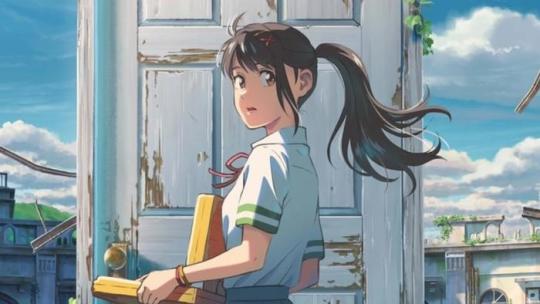
First, for those who haven’t seen the movie
a.) Background: Suzume is a 2023 anime movie written and directed by Makoto Shinkai. While it’s his third collaboration with musicians Kazuma Jinnouchi and the Radwimps, if my research is correct, it’s his 7th feature film. In other words, he’s no stranger to movie making. If you haven’t seen it or Shinkai’s other films, I’d say it’s worth a watch here’s the trailer.
b.) SPOILERS, it’s the nature of an analysis, nothing personal. If you don’t want them then go watch the movie.
c.) Premise: Like many of Shinkai’s other movies, Suzume adds a supernatural layer onto your average adolescent story. In this case, it’s an evil spirit called “the worm” that lives under Japan. Whenever it breaks into our world through certain portals – called “doors” – it causes devastating earthquakes. These doors are usually located in abandoned urban areas, e.g. the entrance door for a shutdown school, or the door of a Ferris wheel carriage at an abandoned theme park. Thankfully these gates have been kept shut throughout the centuries by a group of “Closers” who travel throughout the country shutting any gates that may pop up. Par for the course this “closing” takes the form of a spell and then using a physical key to close the door.
Our heroine, Suzume, starts the movie by unknowingly removing one of the two keystones in Japan that help keep the worm from entering our world. Luckily a young Closer, named Souta, has come to town just in time to help her closer the door. The keystone, called Daijin – a spiritual creature in the form of a cat – decides Suzume has given him a vacation, and after turning Souta into a chair and deeming him the new keystone, our feline friend takes his leave.
The rest of the movie is Suzume and Souta traveling across country to close more doors, return Souta to a human state, and get Daijin to return to his post as a keystone.
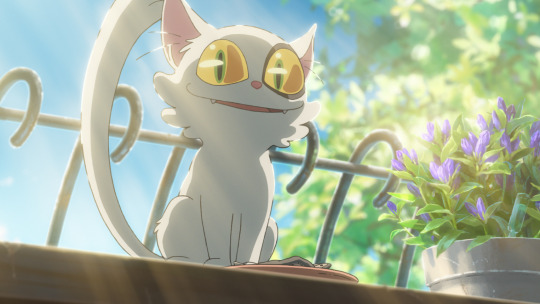
Freed from Keystone duty, Daijin takes the form of a mischievous kitten.
Second, what’s our take on all this?
Seems pretty pagan, isn’t this a Christian analysis Mr. Blogger?
Of course! And as you’ll all recall Vatican II states that “Whatever good or truth is found amongst them [those who have not yet arrived at an explicit knowledge of God] is looked upon by the Church as a preparation for the Gospel” (Lumen Gentium 16). Neither is this anything new since the phrase preparation evangelica comes down to us from Eusebius writing in the 4th century.
So how does Suzume fit into this?
I suggest the events of Suzume mirror key points of salvation history and thus prepare viewers to understand the Gospel. AND I HAVE MANY EXAMPLES!!

St. Paul preaching at Athens appealed to the mindset of his listeners. There weren’t many converts but that’s more from there own complacency than his own method.
Gospel Parallels
a. Need for a Savior
Halfway through the movie – once Suzume and Souta have gained the assistance of the other keystone guardian, named Sadaijin – we are offered this reason for all the trouble they’re going through: “to set right what has been wronged by human hands.” But what we later find out is that Suzume and Souta aren’t enough by themselves to resolve the keystone issue. They need help, and it needs to be spiritual a.k.a. divine. This is a great way to highlight the fittingness of the incarnation. Man needed to make reparation to God for his original sin, yet man was also incapable of doing precisely that. Thus, God became man so that He might do what we ourselves couldn’t do.
b. Willing self-sacrifice
Especially poignant to the story is Souta realizing he’s become the new keystone and he’ll be deprived of his human life to remained forever a keystone guardian against the worm. While you could view Souta’s sacrifice as a Christ-like one, I don’t think that does justice to the rest of the movie. His sacrifice is noted, especially by his grandfather, but it’s also pointed out that he didn’t actively will to be a keystone. Instead, he merely resigned himself to the role Daijin forced on him. The key here – no pun intended – is that it is only when Suzume proclaims that she’ll willingly offer herself up as a keystone in place of Souta that Daijin changes his mind, helps free Souta, and takes up his role as keystone once again.
This helps viewers understand that Jesus’s Passion wasn’t simply a matter of gritting His teeth and accepting divine punishment from His Father. Rather, Jesus willingly offers Himself out of love. Christ is very explicit about this when He says: “No one takes it from me, but I lay it down of my own accord. I have authority to lay it down, and I have authority to take it up again” (Jn 10:18).

It was in the context of the last supper, at the beginning of His Passion, that Jesus taught his disciples what self-gift, i.e. what true love of God and neighbor is.
c. Nature and Grace
Related to this previous point is how Daijin agrees to help Suzume after she explicitly expresses her willingness to be a keystone in place of Souta. Curiously enough, Daijin doesn’t force Suzume to keep this promise. He doesn’t even mention it. He simply responds by to it by helping her free Souta. The Gospel parallel is this: God doesn’t simply override our wills to accomplish His plan, but desires to work with us.
Another example of this mystery is how at the beginning of the movie both Suzume and Souta think Daijin is running around opening doors for the worm, but in actuality he is guiding them towards the open doors so that they can close them. He’s trying to call them to a greater service but they don’t understand and so think he’s mischievous and malevolent. Does this not call to mind God’s words in Isaiah “For my thoughts are not your thoughts, neither are your ways my ways” (Is 55:8).
d. Acts of Prayer
The formula that Souta recites to close a door references the hills and rivers of the land as gifts from the gods and how people have enjoyed life on this land but now the Closer offers those all back to the gods. Acknowledging that everything in life is a gift is not just a Christian notion, although Paul clearly articulates it one (1 Cor 4:7 What do you have that you did not receive?)But going beyond our life being a gift from God this formula shows how we are called to offer everything back to our Creator not because He’s greedy and demands it but because it helps us – in the movie it literally keeps a destructive spirit out of our life!) What comes to my mind are the beautiful words of one of the Prefaces for Mass: “For, although you have no need of our praise, yet our thanksgiving is itself your gift, since our praises add nothing to your greatness but profit us for salvation, through Christ our Lord.”

Suzume, having learned from Suota how to close a door, activates the key in her hand. If this looks intense, then know that prayer is just the same since by it we fight against the evil spirits who seek the damnation of souls.
e. Healing of memory
Finally if I can offer a more affective example it’s when Suzume meets her younger self and we finally see her internal resolution to all the emotional trauma she’s been dealing with. But I would argue this is done in an incarnational way. It’s not just don’t mentally. The movie doesn’t just have her visit here old house, or find her old notebooks. It doesn’t even pretend she’s talking to herself in her mind. It has her literally going back in time and meeting her younger self (I did say Shinkai was a fan of this stuff).
Nowadays, it’s very common for people to openly talk about their trauma, but often it’s presented as something that can’t be overcome. But this isn’t the Christian approach. Rather, it is precisely by allowing Christ to be King over all parts of our life – as well as all parts of our past – that we are no longer under the terror or fear of what has happened to us. And this isn’t accomplished by just imposing principles anachronistically. Instead, it’s by finding where and how Christ is working in that moment just as little Suzume actually encounters her older self on that cold snowy night.
Final verdict?
To close, I’ll once again recommend Suzume, but more importantly I encourage you to think about any connections you see in our culture that point to our life of faith in Christ. Don’t be afraid of being too geeky by talking about these things with friends – with respect to time and place of course e.g. not in the delivery room. My point is until we act as if our Christian faith has an influence on how we read, watch, and listen to the world around us, then we won’t have the influence on the world that we should as Christians.
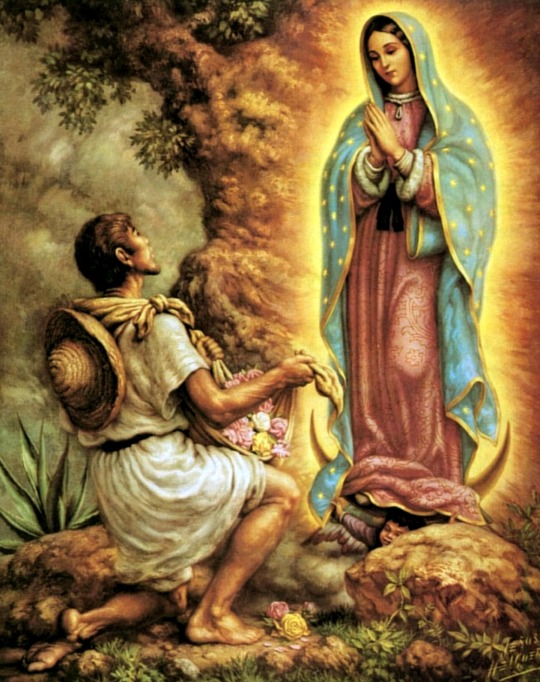
One of the reasons why Mary was so effective in converting the Mexican people is that every part of her dress pointed to some native symbolism which informed the Mexican people of her role and status as the mother of God.
#catholic anime#anime analysis#animechristi#catholicism#suzume#evangelization#christian anime#overthinking
2 notes
·
View notes
Text
Spirited Away: The Power of Names
Offered to Jesus through Mary's hands
Philippians 2:9-11 “Therefore God has highly exalted him and bestowed on him the name which is above every name, that at the name of Jesus every knee should bow, in heaven and on earth and under the earth, and every tongue confess that Jesus Christ is Lord
General Notes:
Some of you need no introduction to Spirited Away, if that’s the case feel free to skip down to the next section.
If you haven’t seen Spirited Away and my recommendation is worth anything then go watch it. This article isn’t going anywhere. It may not be your favorite anime movie, but it has secured its place as a classic for a reason, namely a good story, a decent English dub, and expert directing.
Spoilers will, of course, lie below; proceed at your own will.
This won’t be the only Spirited Away article, so stay tuned.
What’s our focus?
As part of the movie, our heroine, Chihiro, makes a contract with Yubaba. The part I want to focus on is how the contract is sealed. Yubaba steals part of Chihiro’s name thus renaming her Sen. This is more than simply contractual because we learn from Haku that if Sen forgets her original name, then she won’t ever be able to leave. We also learn this is why Haku himself cannot leave Yubaba’s service.
Christians are no strangers to name changes. We have men and women throughout the Old and New Testament that have their names changed. Some Christians imitate this by taking baptismal or confirmation names. Name changes signify a change in identity and mission, but I’m not going to focus on the name change. Rather, I want to focus on the consequences of knowing someone’s name. For example: any schoolboy whose full name is shouted out knows he’s in big trouble. Likewise, when honoring someone, we always use their full title.
My point for this section is the names have power.
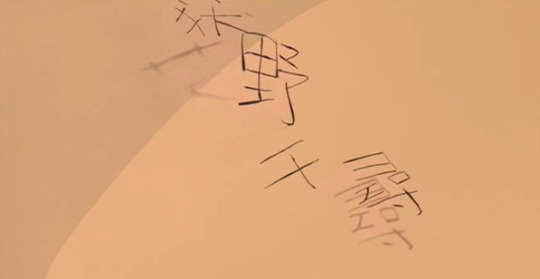
Chihiro's name literally comes off the paper, showing how Yubaba now has power over her because of the contract.
So, where we going with this?
In the Judeo-Christian tradition this is seen in the countless passages where the Lord’s name itself is reverenced. Genesis says men “call upon the name of the Lord” (Gen 4:26). What’s even more fascinating is that God talks about “the place where my names dwells”. This is none other than the tabernacle and latter the temple which was understood to have the divine presence resting over the ark of the covenant.
We see then the divine presence is linked with the Lord’s name.The whole 2nd commandment about not taking the Lord’s name in vain makes a lot more sense then when profaning the Lord’s name is the same as profaning the Lord himself.
Okay… and?
The consequences for Christians are huge and wonderful! We know the name of God in the flesh: Jesus! His name literally means “God saves” reminding us He saves us from sin, but he also points towards the Old Testament Joshua who fulfilled the mission of Moses of leading God’s people into the promised land. Peter makes it clear that there is no other name by which we are saved (Acts 4:12).
If there is power in the spoken name of Jesus, do we use it to our advantage? How often do we use Jesus’ name as a prayer in itself? The early monastic tradition had a very simple way of praying with Jesus’ name. “Lord Jesus Christ, have mercy on me a sinner.” It’s a simple invocation that can be repeated and even synced with our breathing.
My favorite insight about the power of Jesus’ name comes from St. Hesychios: “the more the rain falls on the earth the softer it makes it; similarly Christ’s holy name gladdens the earth of our hearts the more we call upon it.”
For those who like an anime reference, recall how in Spirited Away Haku regains his memory by hearing his real name, or how in Noragami, Hiyori is literally able to summon Yato by calling his name. How much more can we who call upon the name of Jesus profit since our God has conquered death!
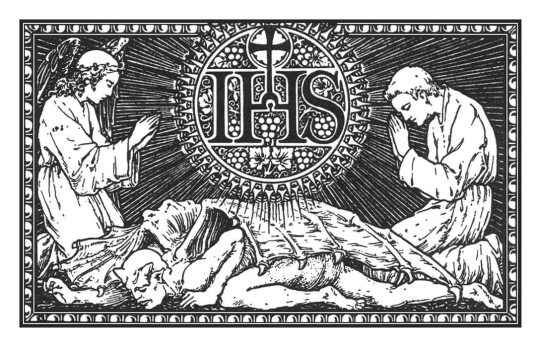
IHS is an abbreviation for Jesus' name in Greek. In this image it's shown literally crushing the devil.
Parting Advice
If I can leave some homework it would be this:
Pray the Jesus prayer, any version that works for you. Even if you can only fit it in before falling asleep, or when you’re stopped a red light on your commute, or waiting in line, or out on your smoke break, or get to church before Mass starts. You won’t regret it.
Benefits: Praying the Jesus prayer reminds us
We can't save ourself
We should turn to Jesus when tempted
Not to lose our peace of heart
to keep our mind on Jesus throughout our daily activities.
After all, the commandment says “do not take the Lord’s name in vain.” But on the positive side, do we reverence the Lord’s name as we should? Do we let it sanctify us? Do we let his name dwell in our hearts?
Lord Jesus Christ, have mercy on me a sinner!
St. Justin Martyr, pray for us!
#animechristi#anime analysis#catholic anime#catholic prayers#name of Jesus#catholicism#spirited away
0 notes
Text
My Hero Academia: Loving our Enemies
1 Timothy 2:3-4 “This is good, and it is acceptable in the sight of God our Savior, who desires all men to be saved and come to the knowledge of the truth.”
First, disclaimers:
As of January 2023, My Hero Academia is an incomplete work so I can’t comment on the series as a whole.
While I would recommend it if you like typical shounen stories, the series might scare off some readers because it isn’t super short.
And of course, there will be spoilers (for things mentioned up to chapter 326).
Second, a quick summary (if you’ve seen the series jump to 3):
My Hero Academia (MHA), takes place in a world where 80% of people have a genetic mutation called a “quirk”. Think of this as X-Men but not as secret. With such a high percentage of the population there’s everything from simple quirks, like super speed, all the way to complex quirks, like being able to steal or transplant the quirk of someone else.
It goes without saying then that “superheroes” have become a normal part of life simply because villains are a part of life. Within Japan, the superhero “All Might” is #1. He’s pretty much the perfect hero. He smiles, laughs, always saves everyone, and always defeats the bad guys. But there’s one problem: he’s dying. That’s where our quirkless main character Deku comes in. He’s a big fan of All Might, and after All Might witnesses Deku rush to protect someone despite being quirkless, he passes on his quirk to Deku. With his super strength no longer putting strain on his body, he can live a little longer and coach Deku in how to use his new power. Now that he has a quirk Deku can attend the esteemed U.A. Hero Academy and start down the path to becoming a professional hero.
What I like about MHA is that it’s not simply “here’s a villain doing bad stuff now stop him”. One of the recurring themes is how the hero system itself isn’t perfect. There are many people who become heroes because it pays well and the public likes you. Afterall, if there’s a real bad villain then someone like All Might will take care of him. Since the series pretty much begins with All Might losing his strength and passing on his power it quickly sets itself up for this peaceful bubble to be popped.

With All Might gone and retired, even with a surplus of professional heroes, the general public no longer feels safe…
Third, what’s this about?
I think a major turning point for MHA is season 5 (late 200’s in manga). The heroes’ organization has just pulled a massive operation against our “bad guys” and lots of things go wrong. Multiple cities end up demolished, many top heroes are killed or severely injured, and a scandal breaks that the new #1 hero “Endeavor” abused his family in his struggle to climb the ranks.
In the aftermath, we watch Deku’s classmates carryout search and rescue operations in a city that’s been destroyed. It’s here we get a scene of a hero just standing still while everyone is running around. He’s in shock that something this terrible could have happened and he mutters a line that sums up the underlying problem: “I need to find a new line of work.”
For this man “hero” was a profession, a career. It was something you were on and off the clock for, that you got paid for, that you could joke about and complain about with on people on the job just like any other job you might have. But being virtuous isn’t an exterior role for us; it’s an interior disposition which informs all our actions – whether we’re on or off the clock.
Unfortunately, this one example isn’t the minority. Over the course of the series, we’ve seen too many people that treat being a hero just like a regular job. Case in point, after this operation many heroes resign/retire and are viewed as quitters by the common folk who now take policing into their own hands.

Overwhelmed by the chaos, a hero stands paralyzed amidst cries for help.
So where does the series go from here?
We might think a typical answer to such a societal problem would be for the “good guys” to preach a “do good deeds even if they’re difficult and no one thanks you” attitude. In all fairness, My Hero Academia probably falls into this mentality a few times. But I do think the show sometimes goes beyond this by answering the question “why do we continue in the face of difficulty?” MHA doesn’t always make this question explicit, but what we see is that everyone is worth saving because everyone has inherent worth and dignity as a person.
Related to this is another theme that runs in the background of MHA: how do we treat villains? Do we capture and restrain them, or eliminate them? And who is the one to judge which course of action is taken?
Take for example the character Lady Nagant, a hero whose quirk allows her to be a deadly sniper. As a professional hero she was tasked by the Public Safety Commission to take care of loose ends and cover up the choices made by the Commission that they didn’t want the public to know about. She eventually snaps under the stress of living a double life to the public and kills her commanding officer in an attempt to get out of the system. She ends up going to prison only to be freed years later by our “big bad guys” who enlist her help in capturing our main character Deku.
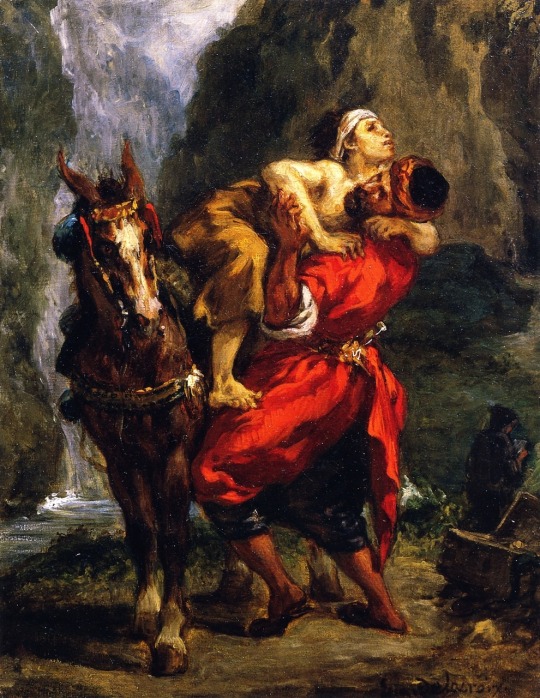
Samaritans and Jews were sworn enemies, yet this man goes out of his way to save a man he had no connection to.
Painting by Eugène Delacroix
Are you going to make your point already?
Yes, I am. To do that I want to look closely at the fight between Deku and Lady Nagant. On one hand it’s very cliché but that also makes it easy to understand because we’re pitting two stereotypes against each other: the calloused veteran Lady Nagant who’s seen the dark side of hero work and wants to destroy the system vs. the young idealistic student Deku who wants to be a symbol of justice and peace just like All Might. Obviously Nagant can see her past self in Deku and that causes her to scorn him all the more.
Towards the end of their battle – when she is almost within Deku’s reach – she fires her rifle at an incapacitated villain nearby, thinking Deku will hesitate between choosing to save him or letting him get shot and this will give her enough time to escape. However, Deku doesn’t miss a beat. Not only does he not hesitate in choosing to protect this incapacitated villain, but because of this he’s able to pull him out of the bullet’s path, and wait there’s more! He then immediately jumps back to grab hold of Lady Nagant who in escaping lost her balance and was in a free fall. Even if she was just trying to kill him, Deku has a desire to save anyone he can.

Fourth, that’s great but isn’t this a Catholic blog?
It is, and here’s the point. Remember when Jesus says “love your enemies, and do good and lend, expecting nothing in return” (Lk 6:35). Deku is someone who does not hesitate to love his enemies. He saves people not because it’s his job, but because he wants to save as many as he can; and he’s not going to let anyone tell him he can’t. In comparison to those who are simply heroes for a job, Deku is the real deal. This is why when Lady Nagant witnesses his lack of hesitation to save not only a bystander but also herself, she has a conversion. She realizes that there are indeed people who aren’t just doing this for a job but who honestly want to help everyone they meet. Why is Deku’s behavior either so inspiring or so infuriating? Because, as our opening verse points out to us, the desire to save is a very Godlike desire.
But we can ask the question: is this realistic behavior? Is Deku simply an ideal but ultimately unrealistic character? Or is his behavior something we could actually do? And if so, what has to happen for someone to get to Deku’s point?
I think our way into answering this comes from Genesis 1:26 “Then God said, ‘Let us make man in our image, after our likeness’”. We obviously aren’t God, and we don’t ever become God, but we are made in His image, and we can become His sons. The result is that through Jesus Christ and being filled with the Holy Spirit we can do Godlike things. This establishes two things that I alluded to earlier in section three:
Every human person has an inherently dignity or value being made in God’s image
As sons and daughters of God we learn to see as God sees, to rejoice in what God rejoices in, and to love as God loves.
If you haven’t read C.S. Lewis’ The Weight of Glory, take some time to read it over. Lewis has a great way of getting us to see the eternal value of our neighbors around us – and not just those we like but everyone!
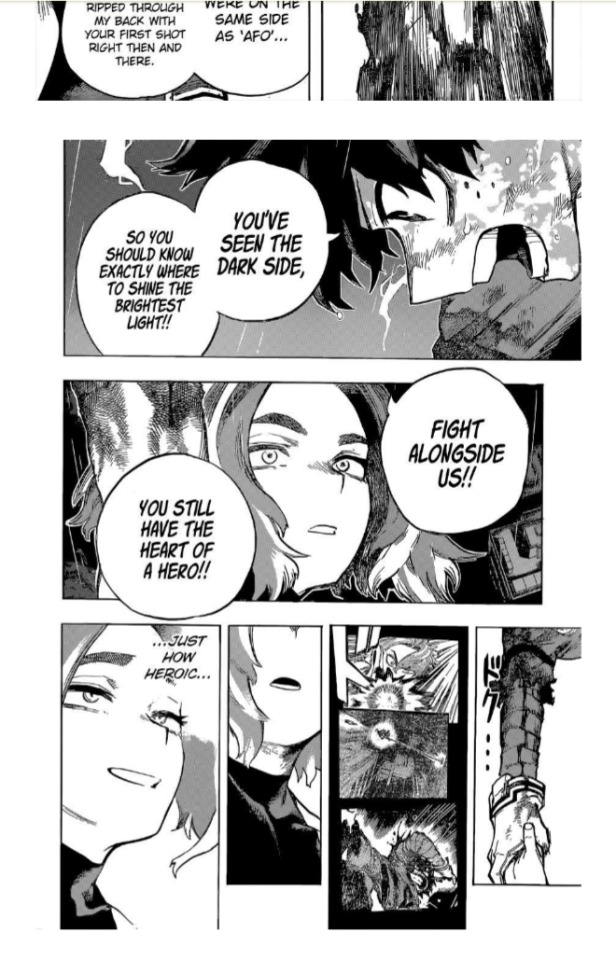
Lady Nagant can’t help but be struck by Deku’s truly heroic actions
Fifth, God desires all men to be saved
WE ANSWERED THE QUESTION!
We see then that Deku’s attitude is not just a nice ideal in a story but a real disposition we can and have begun through Baptism into Christ Jesus. But I know from my own history that I’m not perfect, and that I fail to love my enemies as Jesus instructed us. So how do I change? If we’ve established the foundation, how do we reach the level of love of a “true hero”?
We can start with very simple actions. I myself like the example of St. Therese of Lisieux. Whenever one of the other sisters in the convent would get on her nerves, she would picture Jesus in their place. If someone was making a lot of noise in the church, she would offer it as a song to God. For myself – believe it or not – I run into a decent amount of people who don’t like anime. But I know they like a lot of things that I don’t really like and so I thank God that there’s someone who is able to appreciate His creation in a different way than myself.
But people who annoy us or who disagree with us aren’t necessarily our enemies. What about people that actually hate us? Keeping in mind the fact that God desires all men to be saved I think of 2 points.
First, while we still breathe, there is always time to repent. This is true for us and our persecutors. Lady Nagant had turned her back on the hero society, been imprisoned, and was hunting down Deku to help capsize what remained of the hero society, and yet she was able to have a conversion before dying precisely because Deku loved his enemy. This is also why, like Deku, we must not hesitate in our evangelizing efforts to all people. Because once we pass from this life, there is no more chance for conversion.
Second, for those actively persecuting us, what do we do? We don’t have quirks like the characters is MHA that allow us to “fight back”. But we do have something much more effective. Here again I’ll refer to St. Therese: “it is prayer, it is sacrifice which give me all my strength; these are the invincible weapons which Jesus has given me.”

Prayer is not magic, but it is effective. Prayer is not just words. It is action. And if it is authentic, it will be invincible in the end. Our Lord prayed in Gethsemane for the strength to endure the way of the cross that lay before Him. Think also of the first 300 years of Christianity and of all those being persecuting for following the way of Jesus who prayed for their persecutors. It wasn’t magic, it was prayer and it was effective.
If I can put forward a final, more recent, example I would use the pro-life movement within the United States. The overturning of Roe v. Wade can only be understood within the context of the ceaseless prayers, vigils, fasts, marches, rallies, etc. of pro-life supporters. These are our invincible weapons, and we do not use them only for earthly justice to be satisfied but because we desire all men to be saved, not just those who pray and march with us but for all the doctors and women and men who have promoted the contraception, abortion, and pornography industries. They too can have a conversion away from the culture of convenience and towards the full knowledge of the truth that we are made in God’s image.

Pro-Life supporters at the 2020 march for life
#catholicism#catholic anime#anime#anime analysis#animechristi#my hero academia#boku no hero academia#overthinking#loving your enemies
0 notes
Text
Tower of God: Symptoms of Loneliness
I place this at the service of Christ by the hands of His mother.
“It is not good that the man should be alone” - Genesis 2:18
First, disclaimers:
1.) As of 2022, Tower of God is an unfinished webcomic written by S.I.U., so I cannot comment on the series as a finished whole.
2.) That said, I really like ToG. I think the MC is a great example of someone growing in virtue and the author does a great job at creating a diverse cast of characters. If the art style turns you away, I suggest you hold out since it gets way better over time. Alternatively, you can watch the anime which is a good adaptation with a great OST by Kevin Penkin.
3.) I want to talk about loneliness, but that is a wide category, so this will have to be limited to a specific type as I’ll clarify later on.
Second, here’s the plot:
The premise of ToG is simple. There’s a tower. Climb it. Get to the top, and your dreams will come true. Simple, right? Yes and no. The issue is this: you climb each level - known as a “floor” of the tower - by passing a test, a test where there is always a winner and loser. Thus, it very quickly becomes every man for himself.
Our story begins with Bam a young boy who lives in an underground cave. One day a girl named Rachel stumbles across this cave, and the two becomes friends. But Rachel wants to climb The Tower and tells Bam to forget about her. Our infatuated boy is not to be put down and so quickly chases her up the tower.
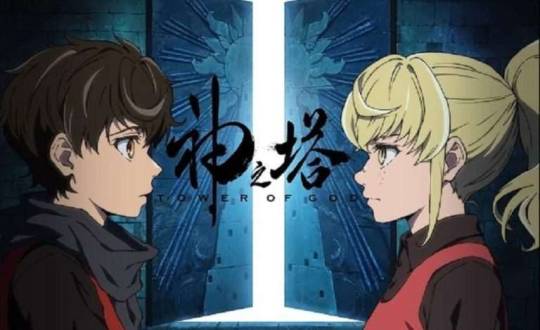
Third, what I want to talk about:
My focus this article is a conversation between Bam and Endorsi a girl who is living only for herself. Endorsi has no problem stepping over people to get what she wants. She grew up in a family that encouraged the strong and neglected the weak. Bam on the other hand, had no one with him in the cave and so treasures anyone he meets.
At one point, the climbers need to get 10 signatures of “friends” they’ve made. Endorsi has set herself up as an independent climber and so she has no one to reach out to for such a task. At the same time, she finds herself out of money and so Bam buys her lunch each day in order to get her signature. Later she asks Bam why he wasted the money just to get her signature. His answer? “I hate being lonely, so I don’t want others to be lonely either.”
Endorsi, however, doesn’t immediately say “thank you”. Instead, she tries to defend her isolation. “I like being alone,” she says, “It feels worse to be with someone. They bother you… and make you nervous, so it’s better to be alone.” But Bam turns this argument upside-down. “But doesn’t that also mean… you’re lonely?”
His point is this: for some of us, the dislike of people is not a cause but a symptom of loneliness. And Bam proves this by his next question: “Is that how you feel with me?” To which Endorsi replies: “No.” The point is that, by realizing there are people she enjoys being with, Endorsi now understands loneliness isn’t being with people we dislike but being away from people we do like. If you’ve ever sought refuge in a friend at an event where you don’t know anyone else, I think you’ll know what I mean.
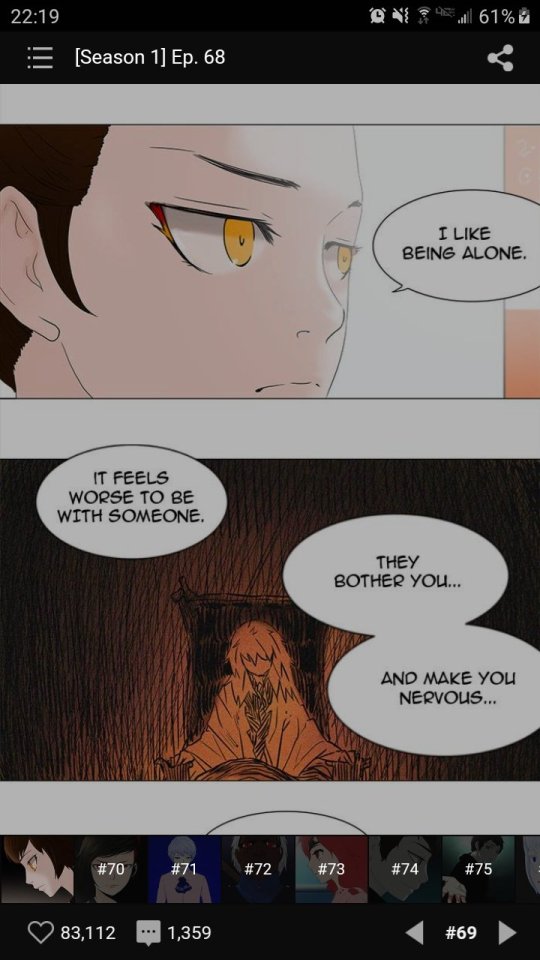
Okay, so what’s the point Mr. “Christian Commentator”
Recall the verse at the top of this page. “It is not good that the man should be alone.” As Christians, we believe that from the beginning of our existence we are called to live in a community. This is why family is not just a social but a natural structure. Despite whatever you may read from Hobbes, Locke, or Rousseau, we never find man simply alone in a state of nature.
We are not meant to be alone – no matter how much we convince ourselves that it’s good for us. Even the early monastic movement was aware of this with solitary hermits being the exception not the norm. You don’t take on the solitary life to be independent but to realize just how dependent you are on God. It makes us grow in humility by knowing we don’t have everything under control.
So now here’s the point.
To move away is also to move towards. In recognizing that it is not good to be alone, we know what it is we should be looking for: building community with others. Big surprise, a recurring theme in Tower of God is whether it’s better to dominate others or work together with others to obtain your goal.
As I mentioned at the beginning, loneliness is a broad category, so I’d like to look at a specific type of loneliness, one that makes us dislike people. Just like Endorsi – when there’s no one around us that we’re comfortable with – we can easily turn to ourselves to accomplish everything. Afterall, wouldn’t asking for help be a sign of weakness? And here pay attention to the lies of the devil: wouldn’t they think I’m stupid? Do they only help me to feel good about themselves? Wouldn’t I be in their debt or be putting myself under them?
All of these are ways the devil gets us to close ourselves off to others and put us in a state that is not good for us to be in. To borrow words from Classroom of the Elite, we mistake isolation for independence. We forget that God has said “Behold how good and pleasing it is when brothers dwell together” (Ps 133:1).
So what are we to do?
Talk is nice, but this is pointless if I don’t offer practical advice. I’d like to preface this by saying these aren’t magical cures, but simply things that I’ve reaped much benefit from.
Frequently invoke the name of Jesus. E.g. “Jesus Christ have mercy on me” or whatever form you find helpful and can be prayed repeatedly while you’re working. This reminds us that we can’t do anything without Him.
If you don’t have a devotion to a particular saint or your guardian angel, get one. Doesn’t matter who; start making friends with those we look forward to spending eternal life with. Just like with Jesus, talk to them about anything that’s happening.
(And this is the one I struggle with most) Put in effort to know more about people, it will help you love them. Spend time learning about their likes, dislikes, and family, and most importantly don’t be afraid to share your own life with them. (Endorsi wouldn’t have realized her scenario if she hadn’t talked with Bam about it)
As I said, this is not a cure-all. But it is a place to start. When we find ourselves hating the company of others, let’s stop and ask ourselves why. If it’s because we think we don’t need anyone, then that’s the first sign we’ve gone too far.
I could go on but will stop for now. Perhaps this topic can be revisited from a different perspective.
St Justin Martyr, pray for us.
3 notes
·
View notes
Text
Akudama Drive: Where does our happiness lie?
I place this work in Mary’s hands that she make it acceptable to Jesus Christ.
Sirach 11:28 “Call no one happy before his death; a man will be known through his children.”
First, disclaimers:
Akudama Drive was first brought to my attention because of its animation quality and fight scenes. While I agree these are fun to watch, I don’t think you should just jump into the show based on that alone. Akudama Drive is violent and gruesome. Some of this is completely unnecessary while other actions, like characters’ deaths or wounds, are part of the plot. This is my personal opinion but I wouldn’t recommend it to those under 16. As is usual with a write up like this: there will be spoilers - you’ve been warned.
Second, basic info:
Akudama Drive is an anime original story written by Norimistu Kaiho. It’s about a group of highly skilled and dangerous criminals, called Akudama, that are each hired by the same employer to take on the same grand heist. Sounds like a story we’ve all heard at least once, right? But a nice catch is that each character is only referred to by their job. It’s a helpful way for Kaiho to draw our attention to what he wants to get across in the show: why each of the Akudama has come to be called what they are.
Brawler is a brawler because he lives to fight strong people and win. Hacker is a hacker because he lives for a new challenge and a harder problem to solve. Doctor is a doctor because she wants to control life and death. Make sense so far? It’s a way to show us what these characters live for, i.e. what their purpose in life is.
Of course, this is where the character Swindler comes in. She isn’t someone who has devoted her whole life to one thing like the others, she’s not even a convicted criminal to begin with - she’s a civil servant who gets swept up in all the drama of the story and serves as someone we can relate to. In other words, everyone’s purpose is clear to us except hers.
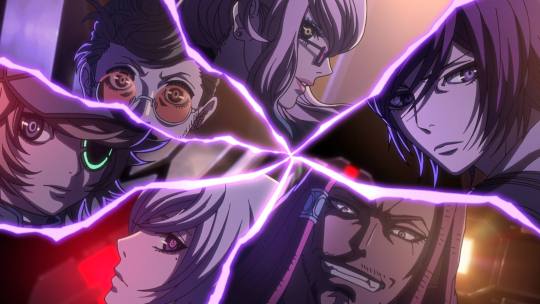
And now for spoilers!
Now people may disagree about this but I think one of the best things about Akudama Drive and what keeps us hooked as viewers is that all the main characters die. Remember what I mentioned earlier: each character lives for a very specific goal and regardless of how it’s done, they only act for themselves. Brawler wants to fight strong people not for any noble cause, it’s just what he likes to do. For example, the only reason all these criminals work together in the first place is because they have death collars put on them by the man who wants to hire them so they’re forced to cooperate.
They’re all selfish, and thus when they die, we may be sad they’re not in the story any more but we can also see that they got what was coming to them. Another way of putting this is: a character’s intention can impact our response to their death. E.g. If Brawler’s goal was to stop the executioner from reaching the rest of the team and kidnapping Brother and Sister, then we would see his death as a valiant sacrifice. In contrast though, he simply fights because he wants to. The mission of Brother and Sister doesn’t gain or lose any momentum from his death because he didn’t die for them. He dies and we soon forget him as the story continues.
How do we treat death in pop culture?
I said before that I like that all the characters die. I suggest two reasons for this:
1.) Not many franchises do this today. They want to keep people alive and want to keep the option of making more movies, and selling more merchandise open for the future.
2.) Having characters die is completely realistic and reminds us that we too will die and we should live with that fact in mind.
Now back to Swindler
I want to argue that what makes Swindler such a great character and makes us cheer her on throughout the show is her selflessness. While everyone else is concerned for themselves, she is concerned for others. In other words: she is the only one who loves. As St. Thomas Aquinas would say she desires the good of the other.
Everyone else is helping Brother and Sister because they see some gain for themselves. Swindler helps them because of their dignity as human beings. Now if you’ve seen the show you may bring up the character Courier who dies helping the siblings escape. But here I would point out that Courier can’t bring himself to help anyone out of love, Swindler has to pay him and make it a duty or contract in order for him to help.
SAC-RI-FICE!
Now this isn’t just me drawing out some Christian themes. Akudama Drive knows exactly what it’s doing. Notice when Swindler is killed towards the end, her death is broadcast across the city and portrayed as an innocent woman getting cut down by cruel authorities. If that wasn’t enough, she dies with a stone cross behind her which gets splattered by her blood. It screams Christian in our face because the cross is the ultimate image of love. It is a love that is willing to lay down its life for the other person. Some people may say Swindler’s death serves to undo the corrupt executioner system. Are they right? Sure. But that isn’t her main goal. Rather her primary goal is to let Brother and Sister get away safely so they can live in freedom (shoutout to Galatians 5:1).
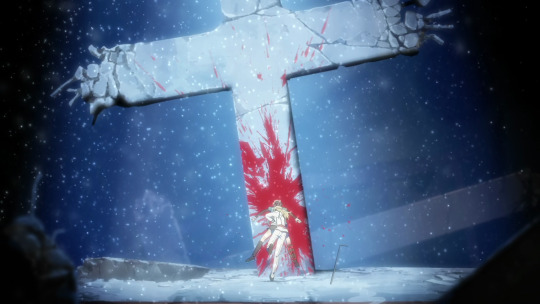
So what’s the point?
Why do some characters rile us up with enthusiasm while others don’t? It’s because we see something good in them and want to support it and even imitate it. We were made for love and so seeing someone love so much appeals to us on a fundamental level. No one cheers on Brawler or Doctor when they die and celebrates saying “hey! they went out with a bang!” Instead, we all root for Courier and Swindler when they choose to persevere until the end. Love stirs us to action. It’s the same reason Mother Teresa of Kolkata strikes us as a bit of a crazy woman, but all of us admire her straightforward and simple goal of caring for the poorest of the poor, for loving them. She’s not doing it for herself, she’s doing it for Jesus Christ.
As St. John writes: “In this is love, not that we loved God but that he loved us and sent his Son to be the expiation for our sins. Beloved, if God so loved us, we also ought to love one another.” (1 Jn 4:10-11)
God has loved us so much! What is our response? “No thanks I’m good”? Or maybe “I really appreciate it, now can I get back to work”? No, rather Jesus Himself has told us what to do: “love one another, just as I have loved you” (Jn 13:34). And how has Jesus loved us? He laid down His life for us. So why do I think Swindler is such a good example of this? Because we have been told: “Greater love has no man than this, that a man lay down his life for his friends.” (Jn 15:13).
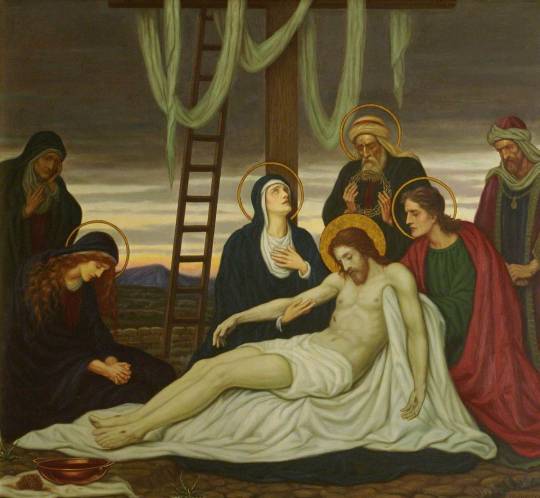
Concluding remarks
If there is one thing that can motivate us to do anything or get us through anything, it is love. This love is not just a feeling, but a greater desire for things to be set right, for good to triumph. Therefore, let us love our good God and thank Him for all He has done for us, and let us imitate the love Jesus shows toward us. We are all capable of it, and only this type of love will fulfill us. If we live only for ourselves – if we do not love – then when we die, we’ll be incapable of receiving any love. Recall that Dante’s ninth circle of hell is a frozen wasteland where those incapable of love are locked in ice and almost nonexistent. So let us love in a radical way even if it kills us because only love of God will ever truly satisfy us.
4 notes
·
View notes
Text
Demon Slayer: Hating Sin, Loving the Sinner
I put this work in the hands of Mary, our Mother, so that she may make it pleasing to Jesus Christ
Philippians 4:8 “Whatever is true, honorable, just, pure, lovely, gracious, if there is anything worthy of praise think of these things.”
What is this about? Well, I wanted to write down:
why I think Demon Slayer does a good job of contrasting Good and Evil, as well as Justice and Mercy.
maybe show how Christianity can confirm but also go beyond some of the themes presented in the work
P.S. This article is probably better understood if one has either seen the first season of the show or read the first 5 volumes of the manga.
First, disclaimers:
Originally a manga, the animation studio Ufotable made what I believe is a beautiful anime adaptation. As of 2022 the anime adaptation is incomplete. The story does have some graphic depictions of violence even if they are animated. I’ve seen a 17+ rating for the anime and while not an absolute rule, I think it’s a good starting place.
There will be of course plot spoilers in this commentary.
Now, the boilerplate:
Demon Slayer takes place in Taisho era Japan (i.e. A.D. 1912-1926). The premise is that there are powerful creatures called demons who eat humans. It may sound simple but that’s the beauty of it. These demons are only active at night as sunlight will disintegrate them. Demons possess super strength and rapid healing abilities for severe wounds. Some will have some type of magical power that becomes stronger the more humans they consume. Besides sunlight, demons can really only be killed by being decapitated with a Nichirin sword (a sword made out of a metal that has absorbed sunlight). I guess it’s still technically the sunlight that kills them. Pretty simple right?
Pretty early on we learn that there is actually only one demon who is creating all the other demons. The root is traced back to a single source. Also early on, Tanjiro, our protagonist, finds his family murdered and his sister, Nezuko, transformed into a demon but here’s the catch: after initially attacking him she recognizes her brother and stops.
After muzzling his demon sister, Tanjiro sets out to join the Demon Slayer Corp. (pretty self explanatory) with two goals in mind.
Find this original demon and kill him.
Find a way to turn Nezuko back into a human.
As the story progresses it’s mentioned that Nezuko’s body may have changed to regain energy from sleeping instead of eating humans. As such she sleeps during the day and sometimes comes out at night to help Tanjiro with his demon slaying job. A cute sibling dynamic.
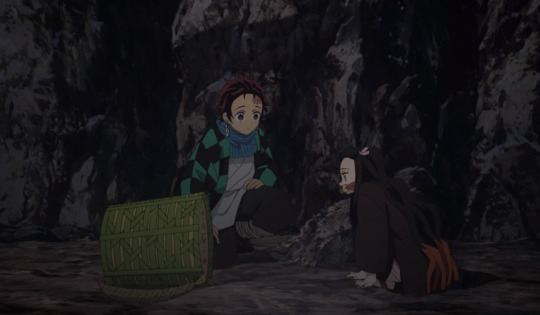
Okay now to the good stuff.
I think what makes Demon Slayer so easy to approach is its simple story. Many times it feels like anime shows have crazy spiraling plotlines that never end. (I’m looking at you DBZ, Naruto, One Piece, Bleach, etc...)
If we all enjoy a straightforward story, then what about Demon Slayer makes it so straightforward? I argue it is the strict dichotomy between good and evil that is portrayed throughout the show. I’m not sure where the idea “evil is always more complicated than we think” came from, but it’s a horrible one. Early on in the show, Tanjiro’s teacher, who understands Nezuko as an exception to demons, says that if she does ever kill anyone, Tanjiro must immediately kill her and then himself. Now I realize most of us can see the japanese honor code seeping through here but his mentor is making the point that right now she is in a quasi-demon state, if she should become a demon (i.e. by eating/attacking people) she is no longer your sister – kill her. We do not tolerate nor do we make exceptions for evil, we destroy it completely.
You might counter that since Nezuko was transformed into a demon why doesn’t Tanjiro or his teacher kill her now. You are raising a valid concern but I would respond that even though the disposition towards evil is within her it has not been carried out. Something the show points out in the fact she doesn’t eat or attack humans. We might say there is a concupiscence within her but it is not acted out in the will, it has been restrained (both physically and mentally).
To me, the clear presentation of good and evil is refreshing, especially if you’ve read a manga called Tokyo Ghoul, which is one that I actually wouldn’t recommend to anyone. Ghouls in that story are like the demons in Demon Slayer except they don’t die by sunlight, so they can do more human things. The protagonist of Tokyo Ghoul is made into a ghoul via surgery and instead of trying to become human again, the series progresses into a nebulous philosophy on the coexistence of humans and ghouls. The closest we get to this in Demon Slayer is a demon who used to be a doctor who has modified herself so that she only needs a little blood to survive. She also steps up to help Tanjiro find a cure to turn his sister back into a human presumably because she wants the same thing and not remain a demon forever!
Let’s talk about Justice and Mercy
And for this we need a little more story summary...
What I’ve said of Demon Slayer so far may have a “Joshua mowed down Amalek by the edge of his sword” or “Samuel hewed Agag to pieces before the Lord” type of vibe. And I know I said the strict division of humanity and demons is what I find refreshing but, the author (Koyoharu Gotōge) does a great job of contrasting Tanjiro’s hatred of evil with his overflowing love and charity. It gives off a sense of what I refer to as “Hating the sin, loving the sinner.”
During the Natagumo Mountain Arc there are two interactions I want to focus on.
Tanjiro killing the mother spider demon
Shinobu killing the sister spider demon
The first takes place in episode 16. The mother spider demon has killed numerous demon slayers. Upon seeing Tanjiro she realizes how much fear she lives in of Rui, the demon running the spider family, who himself kills any demon he is angry with. She thinks of trying to defend and kill Tanjiro but realizes that if she were to die she would be freed from her constant fear of death and abuse by Rui. What happens next is important:
She lowers her defenses and surrenders to Tanjiro’s attack.
Tanjiro sees this and switches his “Striking tide” attack to one called “Blessed rain after the drought” killing her painlessly.
Now it may seem obvious why people like this so much. It not only shows Tanjiro’s keen observation of details in the heat of battle and his ability to change forms mid strike, but it also shows his merciful side in choosing to deal out a painless death. But what can be overlooked here is that the spider demon still dies! Yes there is mercy, but no one - neither she nor Tanjiro - tries to make her crimes seem less than what they are.
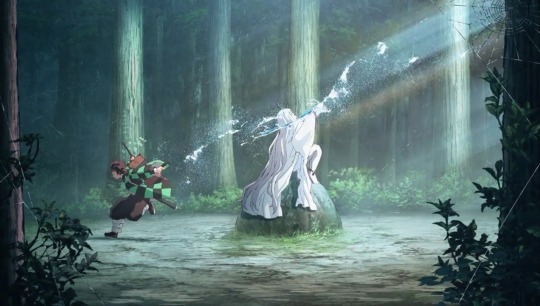
The second interaction takes place in episode 20 where Kocho Shinobu, a high ranking demon slayer, confronts the sister spider demon. Unlike Tanjiro’s scene, this one has a bit more dialogue so I’ll provide a summary below.
1.) Spider demon once captured, begs for mercy and says Rui forced her to kill people
2.) When asked how many she killed, she lies saying "5, but I was forced to"
3.) Shinobu says she saw 14 other cocoons on the western side of the mountain, and
guesses the sister demon may have possibly killed 80 people
4.) Shinobu wants an accurate number so she’ll knows how severe a punishment to deal
out (note: she isn’t planning to kill the demon, but only punish for sins)
5.) She says if the demon goes unpunished the murdered people will go without justice
6.) After she’s suffered her sins will be forgiven, since she’s a demon she won’t die either
7.) Demon rejects this & retalitates. Shinobu says "I can see we'll never be friends"
8.) Shinobu kills her with venom instead of decapitation which may be more painful?
This drawn out conversation offers us more insight than Tanjiro’s encounter.. What we see here is a rejection of mercy because it comes packaged with justice. The demon is willing to admit she’s killed people but tries to pass it off as her being forced to. The old “I didn’t actually want to do those things.” There is a hope to get off easy because someone coerced her (so she claims). After being found out, she corrects the number to 14, but Shinobu again suggests this too is inaccurate. In order to be properly pardoned she needs to be punished for those she killed. Shinobu even mentions that since she’s a demon with regenerative powers she won’t die from this punishment and there won’t be any lasting sign either. There will be pain but the end will be better.
Perhaps this fills the demon with despair in that she is unable to foresee a good outcome among an arduous or painful path. It is also fair to say that some of the punishments Shinobu mentions are quite painful. Either way, she not only refuses but also retaliates. After realizing that the demon isn’t going to repent, Shinobu understands that the only thing she can do is kill her (subtitled dialogue from before “I can see we’ll never be friends”).
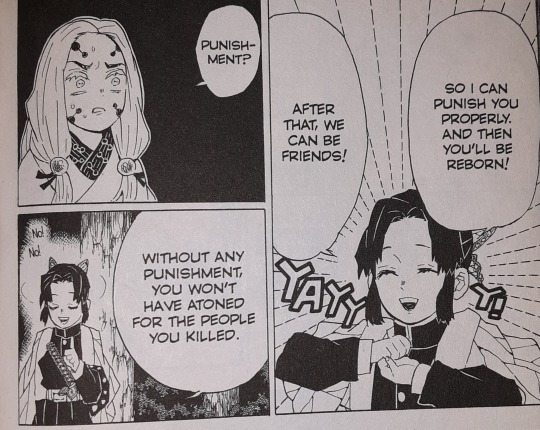

The second interaction takes place in episode 20 where Kocho Shinobu, a high ranking demon slayer, confronts the sister spider demon. Unlike Tanjiro’s scene, this one has a bit more dialogue so I’ll provide a summary below.
1.) Spider demon once captured, begs for mercy and says Rui forced her to kill people
2.) When asked how many she killed, she lies saying "5, but I was forced to"
3.) Shinobu says she saw 14 other cocoons on the western side of the mountain, and
guesses the sister demon may have possibly killed 80 people
4.) Shinobu wants an accurate number so she’ll knows how severe a punishment to deal
out (note: she isn’t planning to kill the demon, but only punish for sins)
5.) She says if the demon goes unpunished the murdered people will go without justice
6.) After she’s suffered her sins will be forgiven, since she’s a demon she won’t die either
7.) Demon rejects this & retalitates. Shinobu says "I can see we'll never be friends"
8.) Shinobu kills her with venom instead of decapitation which may be more painful?
This drawn out conversation offers us more insight than Tanjiro’s encounter.. What we see here is a rejection of mercy because it comes packaged with justice. The demon is willing to admit she’s killed people but tries to pass it off as her being forced to. The old “I didn’t actually want to do those things.” There is a hope to get off easy because someone coerced her (so she claims). After being found out, she corrects the number to 14, but Shinobu again suggests this too is inaccurate. In order to be properly pardoned she needs to be punished for those she killed. Shinobu even mentions that since she’s a demon with regenerative powers she won’t die from this punishment and there won’t be any lasting sign either. There will be pain but the end will be better.
Perhaps this fills the demon with despair in that she is unable to foresee a good outcome among an arduous or painful path. It is also fair to say that some of the punishments Shinobu mentions are quite painful. Either way, she not only refuses but also retaliates. After realizing that the demon isn’t going to repent, Shinobu understands that the only thing she can do is kill her (subtitled dialogue from before “I can see we’ll never be friends”).
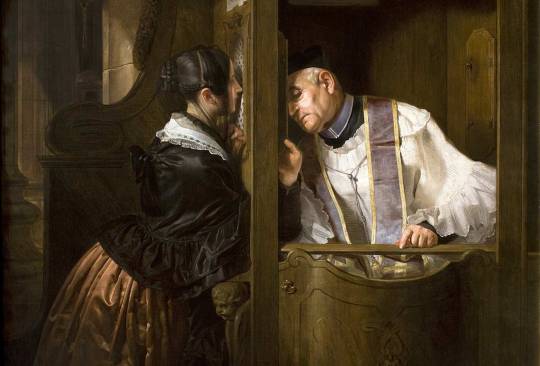
Note that “Sister Spider Demon” refused to do either of these properly, and it was because of this she lost her chance. How many of us have ever told the priest we’re not going to do our assigned penance and then expect him to grant us absolution? NONE! It is precisely the Christian message that through suffering we are purified and brought closer to God, who Himself suffered in the person of Jesus Christ! As is the case in most of the new testament, this refers to unjust suffering and affliction but it also refers to all suffering.
If Demon Slayer really takes place in our world’s Taisho era Japan, then Heaven and Hell are realties. And although we don’t necessarily have power to claim the final destination of these two souls, the evidence seems to suggest they’ll be in different places (or states if you prefer).
Mother spider demon accepts death without putting up a fight and is rewarded with a painless passing. Sister demon fights and once subdued begs for mercy only to lie and refuse the offer. She ends with what seems like a very painful death.
We must cast off our old self and die to ourself in order to gain life.
Finally a short note:
It is difficult for us humans, but it is the Catholic way to use a “Both/And” approach to many topics. There are many dangers in over emphasizing God’s Justice or His Mercy. But we know that properly seeing one gives illumination to the other. Only by fully understanding what we deserve from our sins can we rejoice in God’s mercy that much more. One example: Devotion to the Sacred Heart of Jesus which stems from His Passion and Death is inherently linked with Devotion to His Divine Mercy.
Perhaps a few parting words could be thus:
Evil must be cut out from our lives and it can be painful most times
Even with all our sins, God offers us His gracious gift of mercy.
“Shall we receive good from God, and shall we not receive evil?” (Job 2:10)
Love the Sacrament of Penance since it brings us closer to the Most Blessed Sacrament
3 notes
·
View notes
Text
Noragami: Serving God and confession
I entrust this work to Mary, our Mother, that she may make it acceptable to Our Lord Jesus Christ.
Colossians 3:2 “Think of what is above, not what is on earth.”
First, the disclaimers:
As of April 2020, Noragami is an ongoing series. I am not commenting on the whole series, but simply one aspect of its internal workings put forth by its authors Adachi, and Tokashiki.
This is again a personal opinion, but I wouldn’t recommend the show to just anyone. It is considered a shonen title, yes, but some characters, scenarios, themes, and topics are more mature in nature. I hate to give hard and fast rules but if I was forced, I’d say at least be 16 or 17 years old.
Second, the boilerplate
Norogami, takes places in present day japan and presents the gods of shintoism much like the greek and roman gods. They’re powerful beings who are for the most part immortal and help humans, but also do things like hold grudges, kill each other, cause general mischief and so on.
Throughout their daily duties, each god has one or more servant spirits that assist them in different ways. These spirits are called shinki, which roughly means a sacred treasure. While they usually just hang around looking like people, shinki take on various forms when being employed by their god; some are swords, others are a piece of armor, still others a whip, a lion, a pair of gloves, or an earring, etc.
Here’s a quick piece of information to keep in mind:
All shinki share two traits:
They’re always human souls that have died accidently, and so still have a strong will to live,
They must also be pure and not corrupted in any way.
Fascinating that the best or closest servants of divinity are not lesser gods but must be human, and pure.
Back to the boilerplate for two points
First a quick one: when serving their master, shinki can be pseudo-upgraded into what is called a “blessed” shinki. This only occurs when the shinki risks losing his life in service of his master.
The second one requires more detail: even though they are chosen from pure spirits, shinki are still able to sin, deceive and betray their master. Examples of this are straightforward and include stealing, lusting after a human, directly disobeying an order, and other things. When this happens it causes a sore, called blight, to appear on both the shinki and the god he serves.
One interesting point is that the shinki himself doesn’t feel pain from this blight, the god he serves does feel severe pain from the blight. If the shinki keeps sinning his and his god’s blight will continue to grow and cover the body, with the pain of the god’s blight obviously increasing in pain.

In order for a shinki and god to be cleaned from his blight, the shinki must undergo a purification ritual, called sometimes in the english translation an ablution. What happens is three other shinki must cast a boundary around the blighted shinki while he or she confesses all the things they have done which have caused the blight. If done correctly this cures both shinki and the god he serves; however, if the shinki refuses to repent they will be turned into a phantom and probably attack the other three shinki that made the boundary. This, coupled with the fact that the purification would take an hour or more, is why most shinki don’t want to step up for this task.
And with that we’re done… with the summary that is.
Now let’s get to the reason why people might read this.
First, let’s look at the shinki themselves:
Remember those two criteria I mentioned before? Regardless of the cause I find it fascinating that shinki need a strong will to live. There is no passivity in being a servant. One is made a servant in order to serve. “As the eyes of a servant look to the hand of his master… so our eyes are on the Lord our God.”(Ps 123)
I’d also like to point out as I hinted before that in the Christian worldview, it is human beings, not the angels, that are God’s sacred treasure (shinki?). One detail I didn’t bring up before was that each shinki when called into service is given a name by their god. This sense of a new identity is not foreign to the religious community. We see it multiple times throughout the bible with Abram, Jacob, Saul, and Simon Peter. But, what is more interesting is that the name that a god calls his shinki is written on the shinki itself. I could be stretching this too much but here goes. It is not the body, but the spirit that receives this marking much like the sacraments of baptism and confirmation purify, anoint, and welcome us into our Heavenly Father’s family. In fact the gods of noragami often refer to the multitude of shikni they have as a clan and affix to each shinki’s name a syllable to show the unity of the clan. How much more for the LORD God, from whom “we have not received a spirit of slavery, but of sonship” (Rom 8:15) by which we cry Abba, Father! (Gal 4:7)
I think we can also get a better feel for what it means to say “My God, My God,” or “the LORD my God.” As Christians we often say Our Father. But we can sometimes emphasize the notion that it’s my, Tom’s, Jeff’s, and Bill’s father, which God is -- don’t get me wrong. But, the primary fact is that Jesus Christ and I have the same Father.

For me at least, this sense of “my God” riles up my irascible will because it reminds me that we’re not working under some NGO for some broad national project. We’re working on the personal scale of human to human interactions. God became Man for this very reason. He offers salvation to all of humanity yes, but He does it on the personal level. The sacraments of Jesus instituted show us this deeply personal aspect.
I do not want to come across as defending this pagan work for more than what it is. But if we can see the heroic virtue in greek and roman pagan literature, I think when we see the virtue of religion in other works as well. The Virtue of Religion IS NOT a supernatural practice! Religion falls under the virtue of Justice and rendering to God the worship due to Him. (Summa Theologicae II-II Q.81)
Jumping back to the shinki briefly,
Remember the whole becoming a better shinki by risking your life for your master notion? Now I know some might say the “strike me down and I will become more powerful than you can possibly imagine” mentality can come from any pagan wisdom. But losing one’s life for God, and having it given back, seems to ring a distinctly christian sound (Mt 16:25), especially when it is done out of a personal love and total commitment.
We don’t die to ourself to become part of the eternal impersonal force. We die to gain eternal life by dying to ourselves but also for someone else. It is not just dying, it is sacrifice. Again this is on the personal level.
If I’ve held your attention this long I can finally get to what I originally wanted to write about.
Let’s take a look at noragami’s “purification”
What initially piqued my curiosity was two fold.
First, it isn’t enough simply for a shinki to say sorry and plead forgiveness, rather the shinki must state all the sinful things he or she has done that incurred blight upon themselves and their god. This seems strangely familiar to Catholic ears that might recall “kind and number” (Cf. Can. 988 §1). We know that confession generally speaking is not necessarily a christian notion, but the specificness seen here definitely appears to lean toward that understanding. (James 5:16)
What is unfortunately lacking in noragami is a sense of penance beyond the usual “I’ll back it up to you by working harder” mentality. Although, part of me wonders if this could be covered by the painful process of the purification ritual. But there isn’t much detail to go on with that so perhaps we’ll leave it at that.

Second, the fact that if a shinki refuses to confess he or she will eventually be turned into a “phantom”, the noragami equivalent to demons or ghouls, and will then have to be killed, seems quite drastic as well. Being a pure spirit and becoming a shinki does not guarantee a good life. Rather it is carried out in every action we do. Again, at least for me, I get quite the “Thy will, not my will be done” vibe from this. Or perhaps keeping with the servant imagery “non serviam” is brought to mind.
Another key point to bring up is that while we take for granted the reasons why sins such as these are morally wrong, characters in Noragami explain that since a shinki no longer belongs to the human world, even though they were once human, it is disorder for them to seek human things, such as wealth, sexual pleasure, food and drink. Again I could be connecting things that have no relation but does this not sound like St. Peter’s exhortation: “like obedient children do not be conformed to the desires you previously had,” (1 Ptr 1:14 ) or St. Paul pleading to the Ephesians “you were taught to put away your former way of life, your old self, corrupt and deluded by its lusts, and be renewed in the spirit,” or his letter to the Romans “let us live honorably as in the day, not in reveling and drunkenness, not in debauchery and licentiousness, not in quarreling and jealousy. Instead, put on the Lord Jesus Christ, and make no provision for the flesh, to gratify its desires.” (Rom 13:13)
Obviously, Noragami is a work of fiction and not a theological presentation. Analogies break down. One obvious way would be that our sins don’t necessarily weaken God to the point of being bedridden as the show portrays the effects of blight on the shinto gods. God does not need us, and so we can never hurt him in this regard.
Nevertheless there is quite the devotion in Catholic Churches to do penance in reparations for the wounds the Jesus received during his passion and death, particularly His Sacred Heart that was pierced for us. The words St. Margaret Mary Alacoque received from our Lord come to mind.
“Behold the Heart that has loved men so much that It has spared nothing, even to exhausting and consuming Itself, in order to testify to them Its love. But in return I receive from the greater part of mankind only ingratitude, by reason of the contempt, irreverence, sacrilege, and coldness shown Me in this Sacrament of Love.”
In conclusion,
I’m glad you made it this far. If you haven’t picked up on it already, part of me has a certain miles Christi type spirituality sometimes and sometimes action shonen titles can stir up that militant spirit as they do most kids. I like to think this is me being child-like and not childish since the kingdom of heaven belongs to ones such as these (Mt 19:14), but I guess I could be wrong.
3 notes
·
View notes